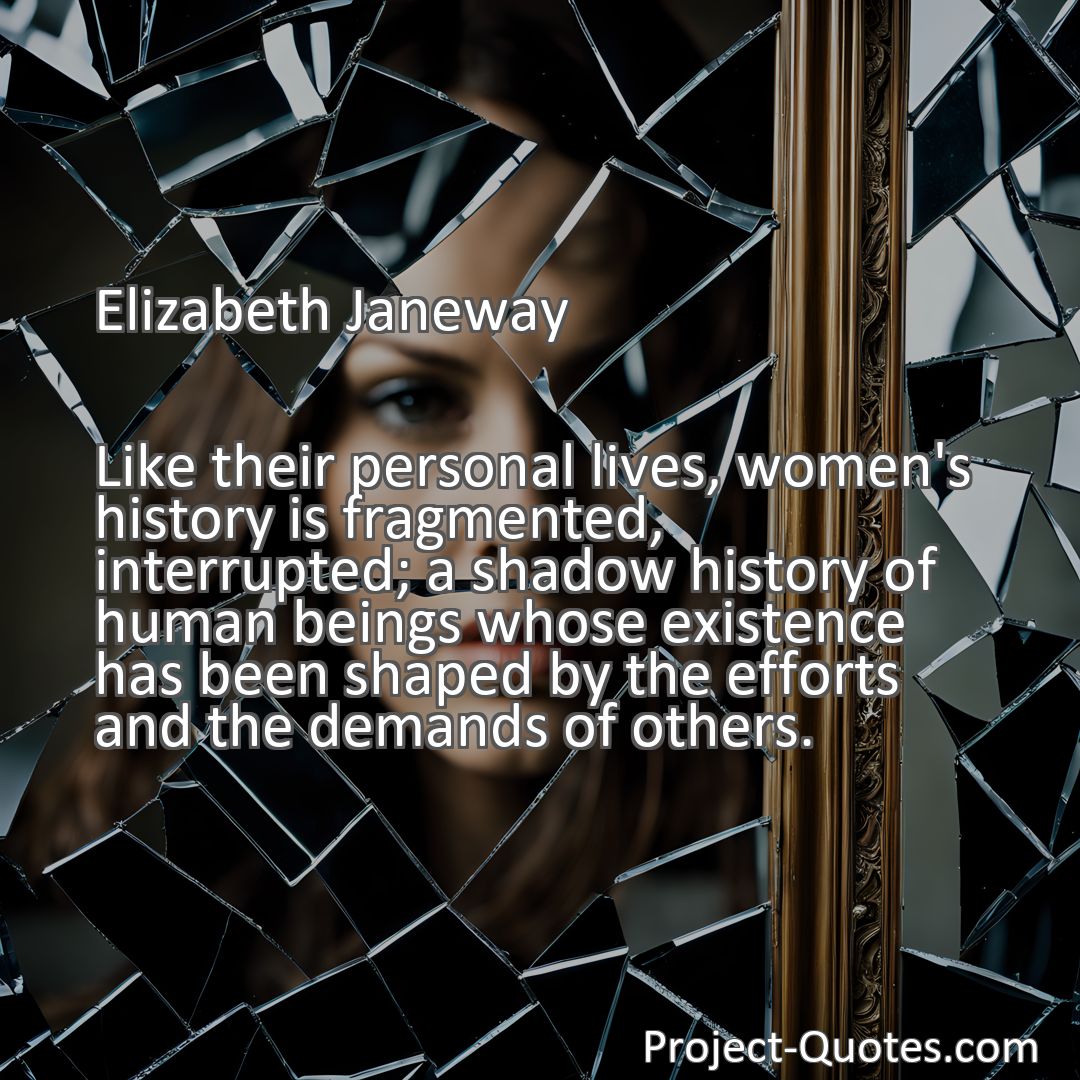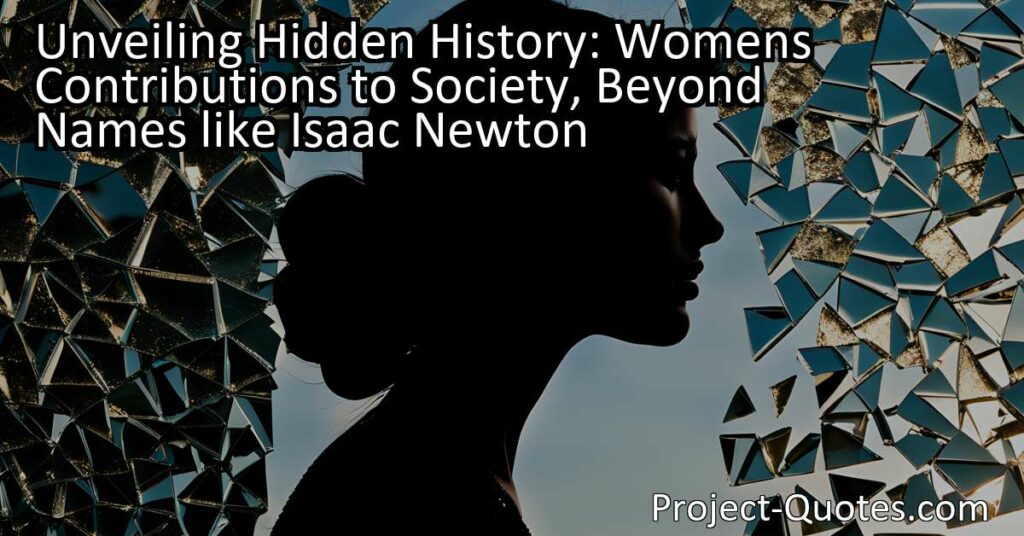Like their personal lives, women’s history is fragmented, interrupted; a shadow history of human beings whose existence has been shaped by the efforts and the demands of others.
Elizabeth Janeway
Unveiling Hidden History: Women’s Contributions to Society, Beyond Names like Isaac Newton Discover the extraordinary contributions of women throughout history that often go unnoticed. From groundbreaking scientific discoveries to masterpieces in art and literature, women have defied expectations and left an indelible impact on society. Let us shine a light on their achievements and inspire future generations to break barriers and pursue their dreams.
Table of Contents
- 1 Like their personal lives, women’s history is fragmented, interrupted; a shadow history of human beings whose existence has been shaped by the efforts and the demands of others.
- 2 Elizabeth Janeway
- 3 Meaning of Quote – Like their personal lives, women’s history is fragmented, interrupted; a shadow history of human beings whose existence has been shaped by the efforts and the demands of others.
- 4 Freely Shareable Quote Image
- 5 Related
Meaning of Quote – Like their personal lives, women’s history is fragmented, interrupted; a shadow history of human beings whose existence has been shaped by the efforts and the demands of others.
Women’s history, just like their personal lives, often remains fragmented and interrupted. It can be seen as a shadow history that reflects the struggles and triumphs of female individuals whose existence has been influenced and shaped by the efforts and demands of others. Throughout the years, women have fought against countless obstacles and injustices to make their voices heard and their achievements recognized. This shadow history serves as a poignant reminder of the significant contributions women have made to society and the ongoing struggle for gender equality.
One aspect that contributes to the fragmentation of women’s history is the lack of documentation and representation. For centuries, society has predominantly been patriarchal, with men typically occupying positions of power. As a result, women’s stories and experiences have often been disregarded or overshadowed by those of men. Historically, women were prevented from pursuing education and formal careers, which limited their opportunities to record and share their stories. Therefore, women’s history is often based on fragmented accounts, oral traditions, and limited archival resources.
However, despite the challenges, women have always found ways to make their mark and drive societal change. From ancient times to the present day, countless remarkable women have defied societal norms and expectations, leaving an indelible impact. These women have played crucial roles in various fields, including politics, science, literature, and arts. Yet, their contributions have often gone unnoticed or underappreciated in the overarching narrative of history.
One such area where women’s history is frequently hidden or overlooked is within the realm of scientific discoveries. While names like Isaac Newton, Albert Einstein, and Charles Darwin are easily recognizable, the same cannot be said for female scientists who have made significant breakthroughs. For instance, Rosalind Franklin’s role in the discovery of the structure of DNA was largely disregarded for years, with her male colleagues Francis Crick and James Watson receiving most of the recognition. This example exemplifies the fragmentary nature of women’s history, where their contributions are marginalized or attributed to their male counterparts.
Similarly, women’s contributions to the arts and literature have often been overshadowed by male figures. Throughout history, countless women have produced exceptional works of art and literature that have stood the test of time. However, their works have not received the same level of recognition or attention as their male counterparts. Artists like Artemisia Gentileschi, Frida Kahlo, and Georgia O’Keeffe have made immense contributions to the art world, challenging societal norms and expressing unique perspectives. Similarly, writers such as Jane Austen, Virginia Woolf, and Maya Angelou have crafted masterpieces that have had a lasting impact on literature. Yet, their achievements have often been relegated to the category of “women’s literature” rather than being treated as part of the canon of great works.
Another significant aspect of women’s history is their fight for political and social rights. Women’s suffrage movements and feminist activism have played a pivotal role in advancing equality and challenging oppressive systems. These movements have sought to dismantle discriminatory policies and societal expectations that limit women’s rights and opportunities. The suffragettes of the late 19th and early 20th centuries, such as Susan B. Anthony and Emmeline Pankhurst, fought tirelessly for women’s right to vote. Their persistence and activism paved the way for the gradual transformation of societal norms and the recognition of women’s political agency.
Moreover, women’s history also encompasses the experiences of marginalized communities within the broader framework of feminism. Women of color, LGBTQ+ women, and women with disabilities face unique challenges and forms of oppression that intersect with both gender and other social identities. Intersectional feminism acknowledges the overlapping systems of discrimination that affect these women and seeks to address the unique ways in which their history has been shaped by these intersecting factors. This perspective emphasizes the importance of inclusivity and recognizes the need to uplift the voices and experiences of all women.
In recent years, there have been significant efforts to bridge the gaps in women’s history and create a more comprehensive narrative. Scholars and activists have sought to uncover and amplify the stories of overlooked women, shedding light on their contributions and the systemic barriers they faced. The emergence of digital platforms and social media has provided opportunities for grassroots movements and individuals to share and celebrate women’s achievements. This growing visibility has facilitated a broader understanding of women’s history and the recognition of their invaluable contributions.
Expanding women’s history beyond fragmented shadows is crucial for inspiring future generations. By shining a light on the achievements of women across all fields, we can foster a greater sense of inclusivity and empowerment. It is important for young individuals, especially young girls, to see themselves reflected in the narrative of history. By acknowledging the struggles and accomplishments of women throughout history, we can inspire young minds and encourage them to pursue their dreams, regardless of societal expectations or limitations.
In conclusion, women’s history is an extraordinary tapestry made up of countless individual stories, achievements, and struggles. It is a mosaic of resilience and determination, shaped by the efforts and demands of others. By recognizing and celebrating the contributions of women throughout history, we can create a more inclusive and comprehensive narrative that honors their legacy. Women have shaped the world in immeasurable ways, and their history deserves to be cherished, shared, and learned from. Let us continue to uncover and amplify the voices of women, ensuring that their invaluable contributions are never again consigned to the shadows.
I hope this quote inspired image brings you hope and peace. Share it with someone who needs it today!


